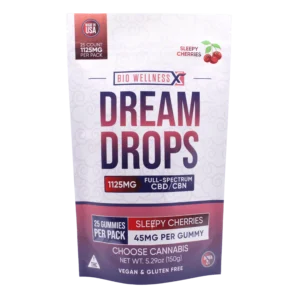key points
If you’re like most people, you might be curious about the right amount of CBD to take for issues like pain, anxiety, and even sleep. CBD, a compound from the cannabis plant, is becoming well-known for its potential benefits, like helping with anxiety and chronic pain. Unlike THC, the compound in cannabis that causes a high, CBD doesn’t have any intoxicating effects. It’s non-psychoactive and comes in various forms—oils, capsules, edibles, topicals, and even skincare products. Since CBD is still relatively new, there’s some uncertainty about its safety and potential side effects. In this article, we’ll cover what you need to know about what dosage of CBD oil is best for sleep and how to find the right product for your needs.
CBD Oil Dosage for Sleep
So, what dosage of CBD oil is best for sleep?
To answer that, we should first understand that CBD might not be a direct sleep aid, but it can help improve sleep, especially if you’re dealing with insomnia caused by anxiety or pain. For better results, a higher dose of CBD is usually needed.
Most people find that taking between 20-40 mg of CBD works best. If you’re trying CBD to help with sleep, start with a higher dose and adjust if necessary.
Keep in mind that some CBD products might work better for sleep than others. For instance, CBD oils that have terpenes like linalool and myrcene might be more effective for helping you relax and fall asleep.
We’ll cover how CBD can help with other issues like anxiety and depression in our upcoming article.
CBD Oil Dosage Calculator
Here’s a quick guide to figuring out your CBD oil dosage. Just look up your body weight in the first column, and then find the dosage that matches how often you want to take CBD. It’s an easy way to see how much you should use!
| Body Weight (KG) | Low Dose (mg/day) | Medium Dose (mg/day) | High Dose (mg/day) |
| 25-35 | 7.5 | 10-15 | 17.5-20 |
| 35-45 | 10 | 15-20 | 20-25 |
| 45-55 | 15 | 20-25 | 25-30 |
| 55-65 | 17.5 | 25-30 | 30-35 |
| 65-75 | 20 | 30-35 | 35-40 |
| 75+ | 22.5 | 35-40 | 40-45 |
Note: This is a very rough guide and is intended only as a starting point. If you have any concerns, always speak to your health professional first.
Determining the Optimal CBD Dose
If you’re new to CBD, it’s important to know that the right dose can vary from person to person. There isn’t a universal dosage that works for everyone.
How much CBD you should take depends on a few things like:
– Your height and weight
– How your body processes it
– The way you take it
– The severity of what you’re trying to treat
Let’s take a look at each of these factors in turn.
Height And Weight
Your height and weight are important factors when figuring out how much CBD you need.
If you have more body mass, CBD takes longer to spread throughout your system and absorbs more slowly.
So, if you’re taller or heavier, you might need a higher dose of CBD to feel the same effects as someone smaller.
Body Chemistry
Believe it or not, your body chemistry really affects how you absorb CBD.
If you have a fast metabolism, you’ll likely feel the effects of CBD quicker and more intensely, but they might not last as long.
On the flip side, if your metabolism is slower, you might need a higher dose to get the same effects.
Dosing
When figuring out CBD dosages, the strength of the product and your personal needs will both play a role. We usually suggest starting with a medium-strength CBD product because it’s easier to adjust the dose up or down from there. However, if you’re new to CBD, you might prefer starting with a smaller dose and gradually moving up to something stronger.
When starting with CBD, a common starting dose is around 5 mg. Many cannabis products like CBD gummies, capsules, and tinctures come in easy-to-measure servings, and you can take them up to three times a day. For example, oil drops often suggest taking 1-3 drops up to three times daily.
Start with this low dose and give it a week or two to see how it affects you before adjusting. Increase or decrease your dose gradually until you find what works best for you. Once you find the right amount, stick with it—no need to keep changing your dose.
The Severity of the Condition Being Treated
Here’s the lowdown: how much CBD you need really depends on how serious your condition is.
If you’re dealing with something mild or that pops up now and then, a smaller dose of CBD will usually do the trick. But if you have a more ongoing or serious issue, you might need a bigger dose.
It’s a good idea to start with a lower or moderate-strength CBD product and gradually increase until you find what works best for you.
What CBD Products Should I Use for Sleep?
Extracts can differ in strength based on how they’re harvested and processed, and the age of the plant can mean that CBD oil contains more than just CBD.
CBD products are legal only if they come from certain low-THC strains of the Cannabis Sativa plant. They might still have tiny amounts of THC, plus other compounds, flavonoids, and terpenes. These extras can actually boost the effects of CBD, making the treatment more effective and longer-lasting.
There are three main kinds of CBD products, and they each differ in how they’re made, what they’re made of, and how strong they are.
- CBD Isolates
- Broad-Spectrum CBD Oils
- Full-Spectrum CBD
CBD Isolates
CBD isolates are basically the purest form of CBD you can get. All the other compounds from the cannabis plant are removed, leaving just the CBD. This means you get the mildest effects compared to other CBD products. Many people go for isolates if they need to avoid THC completely—like if they’re worried about drug tests.
Broad-Spectrum CBD Oils
Broad-spectrum oils have CBD along with other cannabis compounds like CBC, but they don’t have any THC. Sometimes, when companies say “broad-spectrum,” they might only include a couple of these compounds.
These products can give you a bit more benefit than just using CBD by itself, thanks to the combined effects of all the different compounds.
Full-Spectrum CBD
Full-spectrum CBD is your best bet if you want the strongest effects. It’s minimally processed, so it keeps more of the natural compounds from the cannabis plant. This means you get as close as possible to using the whole plant.
These full-spectrum oils might have tiny amounts of THC, but it’s usually in such small amounts that it won’t cause any issues.
What you pick depends on your goals, but full-spectrum CBD is often recommended because it makes the most of the “entourage effect,” where different compounds work together for better results.
If you’re worried about drug tests, you might want to go for CBD isolate. It’s the only type that’s guaranteed to be completely free of THC.
Can You Take Too Much CBD?
CBD is generally safe for most people. Even at high doses, it rarely causes serious problems or toxicity.
You can’t really overdose on CBD, even if you take more than the recommended amount.
If you happen to take too much, you might just feel a bit uncomfortable. Common effects of taking too much in one go can include:
– Feeling sleepy
– Having diarrhea
– Feeling nauseous
But don’t worry—these reactions are pretty rare. To avoid them, just stick to the recommended dose.
CBD is generally safe, but there are some cases where it might interact with certain medications. For example, combining CBD with some antidepressants, stimulants, or blood thinners could increase drowsiness, which might lead to accidents.
It’s a good idea to avoid using CBD with certain diabetes medications or herbal supplements like kava or melatonin. If your medication comes with a warning like “do not drink grapefruit juice while on this medication,” you should also steer clear of CBD.
When in doubt, it’s always smart to check with your doctor to make sure it’s safe to use CBD with your current medications.
Does CBD Have Any Side Effects?
CBD is generally safe for most people, but very rarely, some folks might experience mild side effects. These can include feeling tired, changes in appetite, or diarrhea. These issues are usually because someone took too much CBD too quickly.
To avoid these side effects, stick to the recommended dosage and pay attention to the strength of the CBD you’re using.
Interestingly, many people don’t realize how well CBD is working until they stop using it and notice their aches and pains coming back. So, it’s a good idea to keep track of how you feel when starting a new CBD routine.
Tips for Beginners Who Want to Try CBD
If you’re thinking about trying CBD oil, here’s a straightforward guide to help you get started:
1. Start Small: Begin with a low dose and see how it goes. You can always increase it slowly if needed.
2. Find Your Sweet Spot: It might take some experimenting to figure out the right amount for you.
3. Check with Your Doctor: Before starting CBD oil, it’s a good idea to talk to your healthcare provider.
4. Be Patient: It can take a few weeks or even months of consistent use before you see any changes.
5. Choose Quality: Make sure you get your CBD oil from a trusted source.
6. Store Properly: Keep your CBD oil in a cool, dark place to maintain its effectiveness.
7. Combine with Other Methods: Consider using CBD oil alongside other natural approaches like exercise and relaxation techniques.
8. Avoid During Pregnancy: It’s best to skip CBD oil if you’re pregnant or breastfeeding.
9. Try Different Forms: CBD oil comes in various forms, like tinctures, capsules, or topical creams. Try a few to see which one suits you best.
Final Thoughts: What CBD Oil Dosage is Best for Sleep
When it comes to CBD oil, there isn’t a single “perfect” dosage for everyone. The best approach is to start with a low or moderate amount and adjust based on how you feel. Since everyone’s body reacts differently, you might need to experiment a bit to find what works best for you.
If you’re unsure about how much CBD oil to use, it’s a good idea to talk to your healthcare provider before starting. They can help you figure out the right dose tailored to your needs.

Legal Disclaimer:
By reading this information presented, you agree to release the author of any liability that comes from using this data. This post does not constitute legal advice. Claims about cannabinoids have not yet been approved by the Food and drug administration FDA. Read the full legal disclaimer here.
Other Articles That May Interest You
- Wellness gummies with Myrcene review
- Delta-8 vs CBD, what’s the difference?
- Is Delta-8 legal in Arizona?
- Is Delta-8 or CBD better for pain?
- Delta-8 edibles review
- Is Delta-9 legal?
- Hemp Gummies vs CBD Gummies
References:
- Hemp Production and the 2018 Farm Bill – 07/25/2019 | FDA
- The Controlled Substances Act (dea.gov)
- Hemp Production and the 2018 Farm Bill – 07/25/2019 | FDA
- The Controlled Substances Act (dea.gov)
- The cannabis Terpenes
- Cannabinoids and terpenes
- Therapeutic Efficacy of Cannabidiol (CBD)
- Cannabidiol in Anxiety and Sleep
- Cannabidiol use and effectiveness
- Harvard Health on CBD
FAQs About CBD Oil for Sleep
The best CBD dosage for sleep varies from person to person. It’s generally recommended to start with a low dose, like 10-20 mg, and adjust based on your response. Finding the right dosage might require some experimentation.
There isn’t a universally agreed-upon maximum dosage for CBD, but most people find that doses up to 100 mg are effective and safe. Always start low and gradually increase if needed, and consult with a healthcare provider for personalized advice.
CBD oil may help promote more restful sleep by reducing anxiety and pain, which can interfere with sleep. Its calming effects can make it easier to fall asleep and stay asleep throughout the night.
Yes, CBD oil can potentially improve sleep quality. By addressing issues like stress and discomfort, it may help you fall asleep faster and stay asleep longer. Individual results can vary, so finding the right dose is key.










